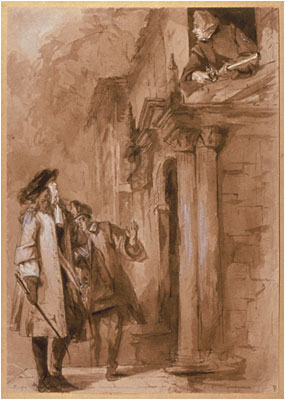Trickster
Trickster is a mythological archetype that appears in the folklore of many cultures around the world. The trickster is a character who exhibits a great degree of intellect or secret knowledge and uses it to play tricks or otherwise disobey normal rules and conventional behavior. Tricksters are often portrayed as a form of animal, such as the Raven in Native American mythology or the Fox in European folklore, but they can also appear as humans or supernatural beings who challenge the status quo through cunning or deceit.
Characteristics[edit | edit source]
Tricksters are typically male characters who revel in breaking rules, boasting, and playing tricks on both humans and gods. Many cultures hold tricksters in high regard as they are seen as clever, if not always wise, heroes who use their wits to outsmart others. However, their actions can also have harmful consequences, leading to moral lessons or insights about human nature and the dangers of unchecked cleverness or ambition.
Role in Mythology[edit | edit source]
In mythology, tricksters serve several important functions. They are often the creators or destroyers of worlds, the bringers of knowledge, and the heroes or anti-heroes of various adventures. Their stories are usually humorous or satirical, reflecting the complexities of human nature and society. For example, in West African mythology, the spider Anansi is a trickster who is also responsible for creating the sun, the stars, and the moon, as well as teaching humans the techniques of agriculture.
Examples of Tricksters[edit | edit source]
- Loki, in Norse mythology, is perhaps one of the most well-known tricksters, famous for his shapeshifting abilities and for causing the death of the god Balder, leading to the events of Ragnarök. - Coyote, from Native American mythology, is another prominent example, known for his cunning and for playing tricks on both humans and gods, often with varying degrees of moral lessons involved. - Hermes, in Greek mythology, started his trickster ways from birth, stealing his brother Apollo's cattle on the very first day of his life. Hermes is also the god of thieves, travel, and commerce, which reflects his cunning and versatile nature.
Tricksters in Modern Culture[edit | edit source]
Tricksters continue to appear in modern culture, often as characters who challenge the status quo or reveal truths through their unconventional methods. They can be found in literature, movies, television, and even political commentary, embodying the spirit of rebellion and change. Their enduring presence highlights the universal appeal of characters who operate on the margins of society, questioning norms and bending rules.
See Also[edit | edit source]
- Mythology - Folklore - Archetype - Cultural hero - Shapeshifting
Search WikiMD
Ad.Tired of being Overweight? Try W8MD's physician weight loss program.
Semaglutide (Ozempic / Wegovy and Tirzepatide (Mounjaro / Zepbound) available.
Advertise on WikiMD
|
WikiMD's Wellness Encyclopedia |
| Let Food Be Thy Medicine Medicine Thy Food - Hippocrates |
Translate this page: - East Asian
中文,
日本,
한국어,
South Asian
हिन्दी,
தமிழ்,
తెలుగు,
Urdu,
ಕನ್ನಡ,
Southeast Asian
Indonesian,
Vietnamese,
Thai,
မြန်မာဘာသာ,
বাংলা
European
español,
Deutsch,
français,
Greek,
português do Brasil,
polski,
română,
русский,
Nederlands,
norsk,
svenska,
suomi,
Italian
Middle Eastern & African
عربى,
Turkish,
Persian,
Hebrew,
Afrikaans,
isiZulu,
Kiswahili,
Other
Bulgarian,
Hungarian,
Czech,
Swedish,
മലയാളം,
मराठी,
ਪੰਜਾਬੀ,
ગુજરાતી,
Portuguese,
Ukrainian
Medical Disclaimer: WikiMD is not a substitute for professional medical advice. The information on WikiMD is provided as an information resource only, may be incorrect, outdated or misleading, and is not to be used or relied on for any diagnostic or treatment purposes. Please consult your health care provider before making any healthcare decisions or for guidance about a specific medical condition. WikiMD expressly disclaims responsibility, and shall have no liability, for any damages, loss, injury, or liability whatsoever suffered as a result of your reliance on the information contained in this site. By visiting this site you agree to the foregoing terms and conditions, which may from time to time be changed or supplemented by WikiMD. If you do not agree to the foregoing terms and conditions, you should not enter or use this site. See full disclaimer.
Credits:Most images are courtesy of Wikimedia commons, and templates, categories Wikipedia, licensed under CC BY SA or similar.
Contributors: Prab R. Tumpati, MD




